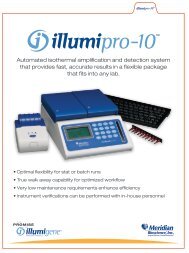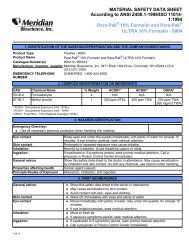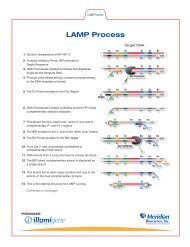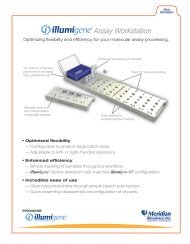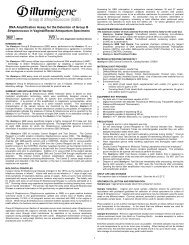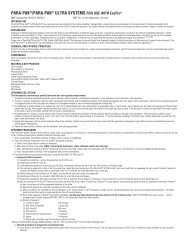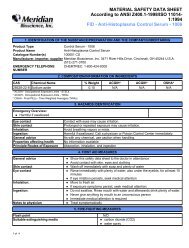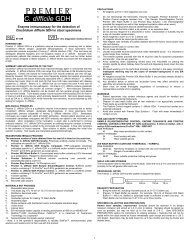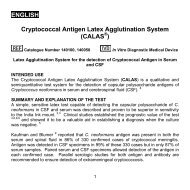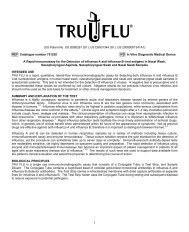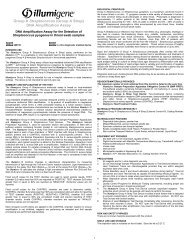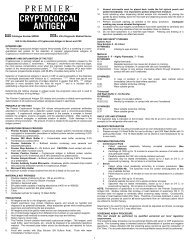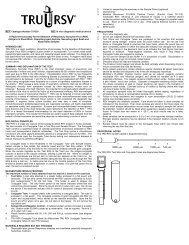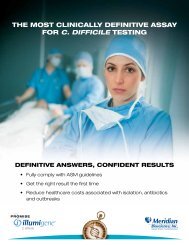GBS Answers - Meridian Bioscience, Inc.
GBS Answers - Meridian Bioscience, Inc.
GBS Answers - Meridian Bioscience, Inc.
Create successful ePaper yourself
Turn your PDF publications into a flip-book with our unique Google optimized e-Paper software.
<strong>GBS</strong><strong>Answers</strong><br />
When Tests<br />
Get It Wrong<br />
There are few things more devastating than<br />
losing a child — especially when it could have<br />
been prevented. The tiny lives lost each year<br />
from infection with Group B Streptococcus<br />
can be saved by better screening and<br />
appropriate treatment.<br />
Group B Strep (<strong>GBS</strong>) is just one of<br />
the many bacterial communities that<br />
colonize a healthy adult. <strong>GBS</strong> bacteria<br />
live harmlessly in approximately 25<br />
percent of healthy women. However,<br />
when the bacteria are transmitted to<br />
a baby during birth, the newborn can<br />
become seriously ill.<br />
Negative Test,<br />
False Reassurance<br />
Stephanie Worthy was tested for<br />
<strong>GBS</strong> 33 weeks into her pregnancy<br />
and the test was negative. Her<br />
son, Jaxton, was born on the<br />
evening of December 7, 2011. He<br />
was completely healthy and sailed<br />
through all the newborn tests with<br />
high marks. Six hours later he<br />
was in neonatal intensive care for<br />
observation. Four days later he was<br />
dead. “They didn’t diagnose him<br />
[with <strong>GBS</strong>] for eight hours,” Worthy<br />
explains, presumably because her<br />
<strong>GBS</strong> test was negative.<br />
RaeAnne Latimore also tested<br />
negative for <strong>GBS</strong>, at 35 and a<br />
half weeks. Her son, Blake, was<br />
born at 5:30 in the afternoon of<br />
January 6, 2012, one month after<br />
Jaxton Worthy was born. At one<br />
o’clock the next morning Blake<br />
was making strange grunting<br />
sounds and Latimore couldn’t<br />
rouse him for feeding. She<br />
became concerned, but the nurse<br />
reassured her that the noises were<br />
normal. Latimore insisted that they<br />
look Blake over in the nursery.<br />
Half an hour later the doctor came<br />
in to tell Latimore that Blake was<br />
seriously ill. At 8:37 that morning,<br />
“our little fighter gave up his fight,”<br />
says Latimore. “They ruled out<br />
<strong>GBS</strong> because of my negative<br />
test,” she explains, but a nurse<br />
practitioner who had been on<br />
the team that tried to save him<br />
thought the symptoms looked like<br />
<strong>GBS</strong> and asked the pathologist to<br />
check for it in the autopsy.”<br />
She was right. <strong>GBS</strong> infection was<br />
the cause of Blake’s death. “Testing<br />
negative doesn’t mean you are<br />
negative,” warns Worthy.<br />
Better Tests<br />
“False negatives can be a problem,”<br />
explains Amanda Smith, medical<br />
technologist in the microbiology<br />
department at The Pathology Lab in<br />
Lake Charles, Louisiana. “We were<br />
researching why even with patients<br />
who were getting good prenatal care,<br />
mothers who tested negative were<br />
sometimes delivering babies that<br />
were infected,” says Smith. In January<br />
of this year, The Pathology Lab<br />
switched from the old culture-based<br />
test to the illumigene ® <strong>GBS</strong> test from<br />
<strong>Meridian</strong> <strong>Bioscience</strong>, <strong>Inc</strong>. because<br />
the molecular test is more sensitive,<br />
according to Smith. As more labs<br />
switch to the more sensitive molecular<br />
test, perhaps outcomes like Blake’s<br />
and Jaxton’s will become even more<br />
uncommon.<br />
7



